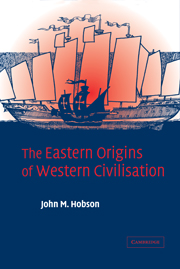Book contents
- Frontmatter
- Contents
- List of tables
- Preface and acknowledgements
- Map: Hobo-Dyer projection of the world
- 1 Countering the Eurocentric myth of the pristine West: discovering the oriental West
- I The East as an early developer: the East discovers and leads the world through oriental globalisation, 500–1800
- II The West was last: oriental globalisation and the invention of Christendom, 500–1498
- 5 Inventing Christendom and the Eastern origins of European feudalism, c. 500–1000
- 6 The myth of the Italian pioneer, 1000–1492
- 7 The myth of the Vasco da Gama epoch, 1498–c. 1800
- III The West as a late developer and the advantages of backwardness: oriental globalisation and the reconstruction of Western Europe as the advanced West, 1492–1850
- IV Conclusion: the oriental West versus the Eurocentric myth of the West
- Notes
- Index
7 - The myth of the Vasco da Gama epoch, 1498–c. 1800
Published online by Cambridge University Press: 22 September 2009
- Frontmatter
- Contents
- List of tables
- Preface and acknowledgements
- Map: Hobo-Dyer projection of the world
- 1 Countering the Eurocentric myth of the pristine West: discovering the oriental West
- I The East as an early developer: the East discovers and leads the world through oriental globalisation, 500–1800
- II The West was last: oriental globalisation and the invention of Christendom, 500–1498
- 5 Inventing Christendom and the Eastern origins of European feudalism, c. 500–1000
- 6 The myth of the Italian pioneer, 1000–1492
- 7 The myth of the Vasco da Gama epoch, 1498–c. 1800
- III The West as a late developer and the advantages of backwardness: oriental globalisation and the reconstruction of Western Europe as the advanced West, 1492–1850
- IV Conclusion: the oriental West versus the Eurocentric myth of the West
- Notes
- Index
Summary
If I remain with those who follow not in my steps
It is more bitter than the dangers of a stormy sea.
Give me a ship and I will take it through danger,
For this is better than having friends who can be insincere …
This [ship] is a wonder of God, my mount, my escort.
(Oh Lord be generous) In travel, 'tis the house of God itself …
I have exhausted my life for science and have been famous for it.
My honour has been increased by [scientific] knowledge in my old age.
Had I not been worthy of this, kings would not have
Paid attention to me.
Ahmad Ibn Mājid, Islamic navigator, c. 1475If my claim made in part I of this book is correct – that Asia was ahead of Europe right down to the nineteenth century – how then are we to confront the Eurocentric claim that after 1500 the Europeans conquered Asia? And how are we to deal with the familiar claim that the post-1492 era constituted the European age of discovery that ushered in Western-led proto-globalisation? Or, in an Asian context, how are we to deal with the familiar Eurocentric depiction of Asian history between 1498 and 1800 as but the ‘Vasco da Gama epoch’? More specifically, how are we to deal with the familiar Eurocentric depiction so vividly articulated by John Roberts in his book The Triumph of the West?
- Type
- Chapter
- Information
- The Eastern Origins of Western Civilisation , pp. 134 - 158Publisher: Cambridge University PressPrint publication year: 2004



